Who blows up Thailand? The southern provinces have long been a war zone.
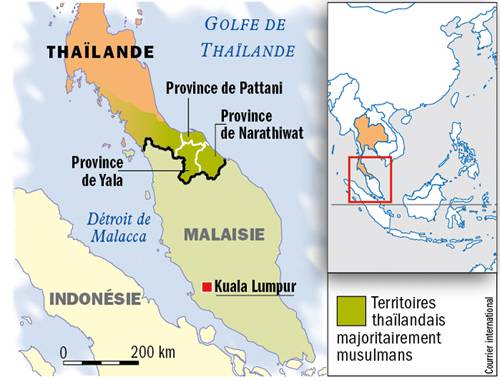 The first version, voiced in the world media, was the actions of international terrorists, but this is not followed by the Thai security forces. According to the Thai secret services, the self-made nature of explosive devices eliminates the possible involvement of terrorist acts by international terrorist organizations - the latter would find the means for more effective explosive devices and would try to carry out the attacks with the highest number of casualties. However, even without international terrorist groups in Thailand, there are enough forces capable of committing such attacks.
The first version, voiced in the world media, was the actions of international terrorists, but this is not followed by the Thai security forces. According to the Thai secret services, the self-made nature of explosive devices eliminates the possible involvement of terrorist acts by international terrorist organizations - the latter would find the means for more effective explosive devices and would try to carry out the attacks with the highest number of casualties. However, even without international terrorist groups in Thailand, there are enough forces capable of committing such attacks. Thailand is a real "tourist power" of Southeast Asia. Resorts in this country are world famous and popular. Recently, however, many global media have been writing about the growth of the terrorist threat in Thailand. Until recently, South-East Asia was not a noticeable region on the map of international terrorist activity. In some countries of Southeast Asia, long guerilla wars were fought, but they were limited to the remote mountainous provinces of the Golden Triangle in Indochina or some islands in the Philippines and Indonesia, and were led by their rebel organizations of national minorities or the Maoist communist parties. Thailand is one of the few countries in the region where religious fundamentalists became more active in the second half of the twentieth century.
The overwhelming majority of the country's population are representatives of various Thai, Tibeto-Burmese and Mon-Khmer peoples practicing Buddhism. However, several southern provinces of Thailand are knocked out of the total number. These are the provinces of Pattani, Yala (Jala), Narathiwat (Menara), as well as parts of the provinces of Songkhla and Satun. The named territories are the north of Malacca Peninsula, which, as you know, is divided between Thailand and Malaysia. Long lived here Malay population, which has significant differences from the rest of the peoples of Thailand. Firstly, Malays are practicing Sunni Islam, which leaves an indelible imprint on their way of life, ideological values. Secondly, Malays have their own and very rich cultural traditions, long-standing ties with the peoples of neighboring Malaysia and Indonesia. For Muslims Malays, to be under the rule of Buddhist Thailand is very humiliating, and although Thailand’s discrimination against the Muslim population has long ceased and mosques operate in most provinces of the country, a very large percentage of dissatisfied state and national religious policies still remain among the Malaysian minority.
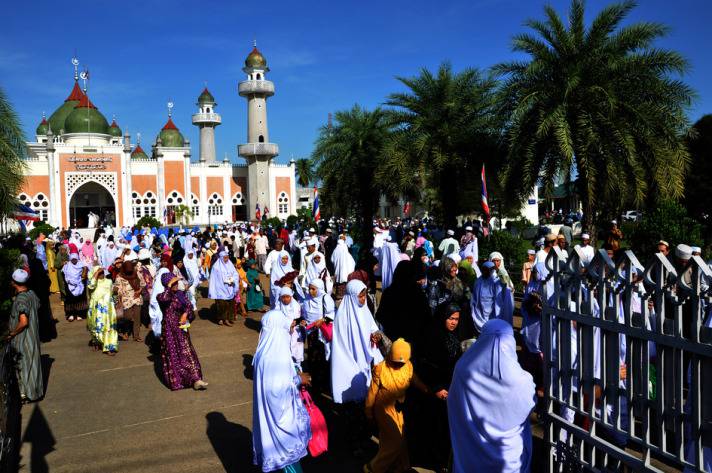
In the 15th century, Islamization of the population of the northern part of Malacca began. On the territory of the three modern provinces of southern Thailand and the two provinces of modern Malaysia was created the Malayan sultanate of Pattani. Its main population consisted of Malays, who professed Islam and spoke in wisdom - one of the dialects of the Malay language. However, the troops of the powerful northern neighbor, the Kingdom of Siam, periodically attacked Pattani. In 1785, the troops of the Siamese King Rama I destroyed the army of Pattani and occupied the territory of the sultanate. The Muslim Malay population found itself a vassal of the Siamese state. This situation persisted in the XIX century, when Malacca became a colony of the British Empire.
In 1826, an agreement was reached between representatives of England and Siam, according to which four Malay sultanates of Kedah, Kelantan, Perlis and Terenggan were under the protectorate of Bangkok. In exchange, Siam granted the British rights to the strategic port of Penang and to trade with the vassal Malaysian sultanates. However, in 1909, a new agreement between Great Britain and Siam was signed in Bangkok, according to which the provinces of Narativat, Pattani, Yala, Satun and Songkhla remained under the control of the Siamese, while England established control over Kedah, Kelantan, Perlis and Terenggan.
Malays have periodically raised rebellions against the conquerors, and in the second half of the twentieth century, not without the help of the rich countries of the Persian Gulf, radical national-liberation organizations emerged in the Malay provinces of Thailand, either for the creation of the independent state of Great Pattani in the provinces of Pattani, Yala, Narathiwat, parts of Songkhla and Satun, or for joining this region to neighboring Malaysia. The largest of these organizations was the United Pattani Liberation Organization, which set as its goal the creation of the Malay Muslim state of Patani Darussalam in the territories of the three South Indian provinces, which were historically part of the sultanate of Pattani.
A new phase of activation of the Malaysian separatists in southern Thailand began in 2004 year. Since then, the Malay radicals have gone to the armed struggle, committing systematic terrorist attacks and attacks on representatives of the Thai authorities. The victims of the attacks were not only officials, police and military personnel, but also, for example, school teachers, whom the Malay radicals consider to be the agents of Thailand’s assimilation policy. The death toll in the attacks of school teachers in the southern provinces of the provinces has long passed to hundreds. In only seven years from 2004 to 2011 in the south of Thailand, about 5 thousands of people died as a result of terrorist attacks and shootings. Gradually, not only did the activity of terrorists increase, but also the number of civilian casualties increased. The radicals turned to the killing of ordinary Thai people - Buddhists who lived in the territory of the southern provinces.
The police and the army respond with mass sweeps of the villages where the Malays live, trying to stop the facts of radical support from the local Malay peasant population. Currently, the contingent of Thai power structures in the southern Malay provinces of the country reaches 60 thousands of military personnel and police. Practically for every thirty local residents there is one soldier of the Thai army or a policeman. But the Malay radicals so numerous contingent of the military still can not stop - as we see, terrorist attacks continue, and their performers find shelter among the local population. The role played by the proximity of the Malaysian border. The population of Malaysia, for obvious reasons, sympathizes with the armed struggle of fellow tribesmen and co-religionists in neighboring Southern Thailand. The struggle for the liberation of Pattani is supported by radical fundamentalist organizations active in Malaysia and Indonesia. They also provide information support for Malaysian separatists in Thailand.
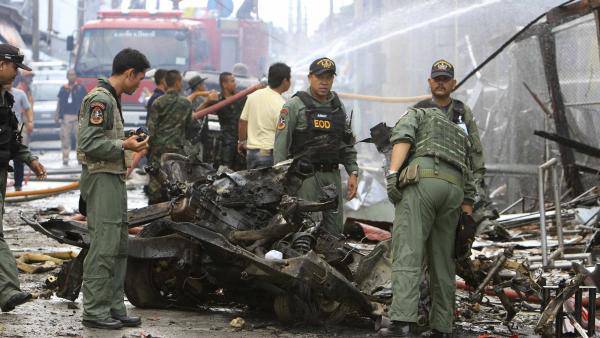
In recent years, as noted by not only Thai and foreign analysts, but also representatives of the national liberation movement Pattani themselves, radical groups have seen a process of significant staff renewal. The radical youth is even more resolute than the older comrades, and also noticeably to the internationalization of the struggle, including the establishment of links with international terrorist and extremist organizations. By the way, the militants of the “first wave” refer to the young shoots of their successors with undisguised respect, noting the great courage and passionarity of the youth. If the 1970-ex-1980 radicals were more nationalists than religious fundamentalists, then the younger generation of fighters for the independence of the Malay provinces of Thailand is distinguished by religious fanaticism and propensity to conduct acts of non-motivated terror, similar to those that occurred in the cities of Southern Thailand 11- 12 August 2016 of the year. Currently, there are more terrorist attacks and attacks in Thailand per year than in Somalia or Yemen, which also speaks of the scale of the radicalization of Malay Muslims in the south of the country.
The rebel units operate in the jungles of Southern Thailand, their total strength is estimated at 10 000 people. A significant part of the militants are teenagers and young people from peasant families who have not found any other use for themselves in peaceful life. Despite the fact that such rebel groups are poorly armed and trained, and the Thai army is considered one of the best in the region, the guerrillas bring many problems to the Thai government. If before 2004, the main focus was on the rural guerrilla war of the traditional type of South-East Asia, now radical groups are increasingly resorting to terrorist acts. This has its own meaning - the creation of an atmosphere of terror and intimidation of the civilian population and foreign tourists deals a serious blow to the tourist economy of the southern Thai provinces.
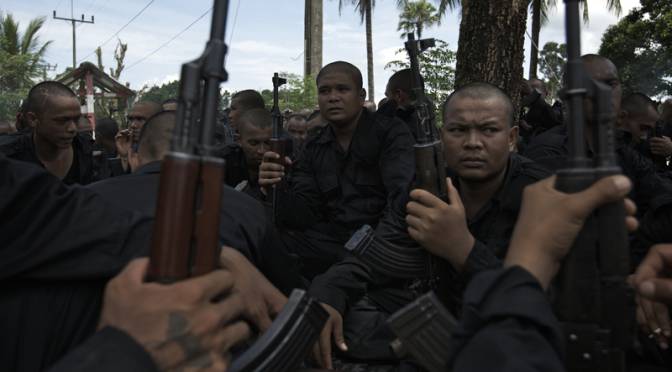
Among the most active organizations of the “new wave” operating in Pattani, first of all, it is necessary to name the grouping “Runda Kumpulan Kecil” (RKK), the core of which consists of young people who profess radical views. They organize attacks on soldiers and civilians, including Malays, who are accused of collaborationism. The grouping is characterized by high mobility - after the attacks, its militants instantly hide in the forests in the territory of neighboring Malaysia, which significantly complicates the fight against them for the Thai special services.
Back in 1989, Barisan Bersatu Mujahidin Patani (BBMP) was created, which is sometimes also called simply Bersatu. At first, she acted with a claim to unite the other rebel groups in the Malay provinces of Thailand, but when her leadership was arrested in 2004, the influence of Bersatu weakened, although she remained active as one of the radical groups.
The Patani United Liberation Organization (PULO) —the same United Pattani Liberation Organization — emerged in the 1960s, but in recent years radical fundamentalists took over the leadership, pushing back the veterans of the organization who adhered to more moderate nationalist views. Now the organization aims to achieve the independence of Pattani with the aim of creating an Islamic caliphate on its territory.
Barisan Revolusi Nasional (BRN) - “The National Revolutionary Front”, which is considered one of the largest organizations leading the insurgent struggle in the jungles of southern Thailand, is taking a more radical stand. At present, it is based on the followers of the Salafi trend in Islam.
The organization Gerakan Mujahidin Islam Patani (GMIP), the Islamic Movement of Pattani, which ideologically focuses on the Al Qaeda international organization (banned in the Russian Federation), also favors the creation of an Islamic state. Establishing contacts with international terrorist groups, Malay radical organizations adopt their methods of action, including the tactics of using suicide bombers and explosions in crowded places.
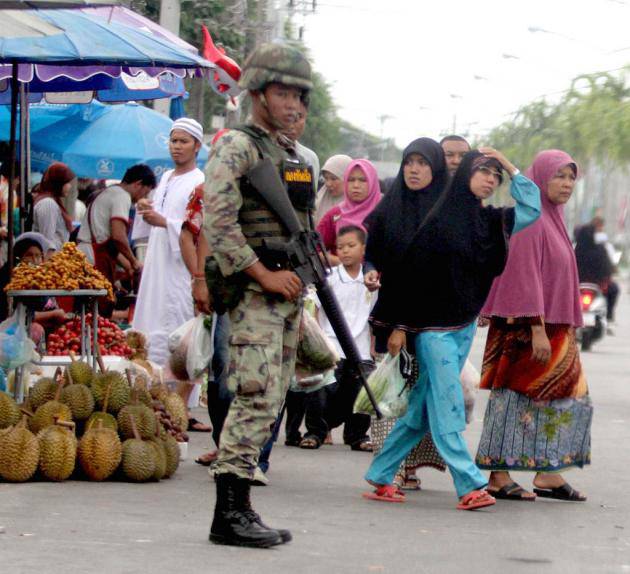
When a coup d'état took place in Thailand in 2008, called the “yellow dressing revolution” in the press, there was hope that the long-standing armed conflict in the south of the country would end. Moreover, among the rebels who came to power as a result of the coup was General Sonthi Bunyaratkalin, who came from a Muslim family. But there have been no fundamental changes in the attitude of the government towards the national liberation organizations of Pattani. There were only relatively timid attempts to normalize the situation in the country. However, in February 2013, an agreement was signed between the government and representatives of the Muslim community in Bangkok. Its signing was supported by the leadership of the National Revolutionary Front, one of the radical organizations of the Malaysian minority based in Malaysia. But almost immediately after the signing of the agreement, many political scientists and journalists questioned its real effectiveness, especially since the most militant radical formations of Pattani, connected with international religious extremism, still refuse from any negotiations with the authorities.
Experts believe that the southern provinces of Thailand are already turning into one of the most dangerous "hot spots" in the world. In fact, they form the basis of the spread of terrorism in the Asia-Pacific region, forming hotbeds of instability - local organizations advocating for the liberation of Pattani, cooperate with radical groups operating in neighboring Indonesia, Malaysia and the Philippines and gradually come into contact with international terrorist organizations. As we see, until Thai power structures are unable to suppress the Malay radical organizations in the southern provinces, which turns South Thailand into a zone of “smoldering conflict” and entails serious losses and risks for the country's economy.
Information